1 Section 1-1
1-1: Greetings, Introductions, and Farewells

|
Formal |
Informal |
|
Guten Morgen! (Until 11 am)
Guten Tag! (During the day) Guten Abend! (After 6 pm) (Audio courtesy of Wikimedia user Galaxy151, |
Morgen! Tag! Abend! Hallo! (anytime) |
For more on regional differences in greetings, check out Dr. Claudia Kost’s (University of Alberta) activity below:
Watch Germanpod101.com’s video to hear these greetings being pronounced.

Wie heißen Sie? What’s your name? How do you call yourself?
Ich heiße ______. My name is _______. I am called _________.
(Audio courtesy of Wikimedia user Galaxy151, Creative Commons Attribution-ShareAlike 4.0 International.)
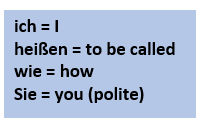
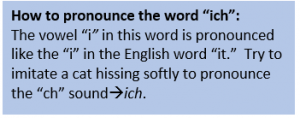
Freut mich! Nice to meet you!
Watch Anja’s video to hear “Ich heiße _______“ and “Wie heißen Sie?” being pronounced and to see her reteaching this lesson.

Woher kommen Sie? Where do you come from?
(Audio clips courtesy of Wikimedia user Jeuwre, Creative Commons Attribution-Share Alike 4.0 International.)
Ich komme aus _______. I come from __________.
For example, if you come from France, you would say, “Ich komme aus Frankreich.”
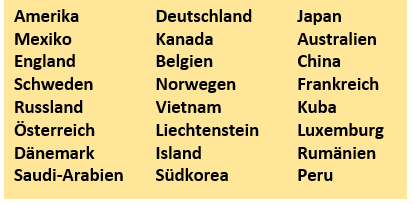

Watch Anja’s video to see her reteaching “Woher kommen Sie?” and “Ich komme aus _________.”
Watch Coffeebreak German’s video to hear interviews with native German speakers answering the question “Woher kommen Sie?”

Wo wohnen Sie? Where do you live?
(Audio courtesy of Wikimedia user Jeuwre, Creative Commons Attribution-Share Alike 4.0 International.)
Ich wohne in ______. I live in _________.
Watch Anja’s video to see her pronouncing „Wo wohnen Sie?“ and “Ich wohne in _________.” After 2:06, she jumps into some more advanced stuff that you won’t learn until next chapter. Feel free to stop at that point, if you want to stick with just what we’re learning for now.
Saying Goodbye:
Tschüss! Bye! (Informal)
Auf Wiedersehen! Good-bye! (Formal)
Bis später! Until later! (Informal)
Bis bald! Until soon! (Informal)
(Audio courtesy of Galaxy151, Creative Commons Attribution-ShareAlike 4.0 International).
Ex. A: Alles über Sie! Write a very brief paragraph introducing yourself to someone else. Don’t forget to say hello and goodbye.
Wie geht’s?

To ask how someone is doing, use the following phrases:
- Wie geht’s? How are you? (Lit. How goes it?)
You can use this phrase with anyone, whether formal or informal. You may be wondering why there is an apostrophe in the word geht’s. This is a short form of “geht es.” We use the apostrophe to show that the letter “e” has been left out.
- Wie geht es dir? How are you? (Informal)
Use this phrase when speaking to someone with whom you would use “du.”
- Wie geht es Ihnen? How are you? (Formal)
Use this one when speaking to someone with whom you would use “Sie.”
Listen to Wikimedia user Galaxy151’s audio clip of these: (Creative Commons Attribution-ShareAlike 4.0 International)
Here are a few ways to answer this question.
|
Positive |
Neutral |
Negative |
|
Gut! Ganz gut! Sehr gut! Super! |
Es geht. |
Nicht gut. Nicht so gut. Nicht sehr gut. |
Ex. B: Wie geht’s? Ask your classmates how they are?
A: Wie geht’s? (Alternative: Wie geht es dir?/Wie geht es Ihnen?)
B: (Use one of the answers above or come up with your own!)
![]()
Test your listening comprehension. (Courtesy of Dr. Claudia Kost & Crystal Sawatzky, University of Alberta.)
Du vs. Sie
In the examples above, you see the word Sie, which means “you.” German has two words for “you”—Sie and du. The chart and the comic strip list some instances when to use du or Sie.
|
Sie |
du |
|
People you don’t know People you wish to treat with respect People who are older than you |
Friends and family Children and pets God People your own age or younger |

It may seem strange at first that there are two words for “you” in German. However, we actually have two ways to say “you” in English: thou and you. Thou is the English equivalent of German du. Nowadays, it has become old-fashioned, but we still see it in Shakespeare’s works and the King James Version of the Bible. Whenever you see the word “thou,” it is implied that the people are very close to one another or know each other very well.
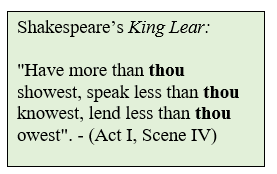
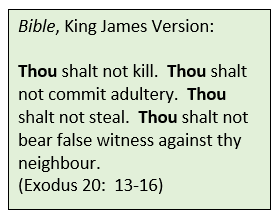
For a more in-depth discussion on “du vs. Sie,” feel free to watch Easy German’s video–DU oder SIE?
![]() Test your listening comprehension. (Courtesy of Dr. Claudia Kost, University of Alberta.)
Test your listening comprehension. (Courtesy of Dr. Claudia Kost, University of Alberta.)
Ex. D: Video: Nicos Weg. Folge 1: “Hallo!” Watch the video and do the online activities associated with it.
Pronouns
You have already learned the pronouns Sie, du, and ich in German. Here are two more pronouns:
er→he
sie→she(Easy way to remember; sie rhymes with “she.”)
Notice that the word for “she” and “you” are the same, EXCEPT that it is capitalized when it means “you.”
Er heißt Kevin. He is called Kevin.
Sie heißt Jana. She is called Jana.
Notice the endings:
- ich heiße
- er/sie heißt
- Sie heißen
German changes the ending of verbs according to the subject, i.e. ich, er/sie, Sie, etc. You will learn more about this later on in this chapter.

Ex. E: Wie heißt er? Wie heißt sie? Below are pictures of several well-known personalities. Wie heißen diese Menschen? Answer using a complete sentence.
![]()
 4.
4. 
 5.
5. 
 6.
6. 
We can take it one step further to use “er” and “sie” with the verbs “kommen” and “wohnen.”
Er kommt aus Kanada. He comes from Canada.
Sie kommt aus Deutschland. She comes from Germany.
Er wohnt in Berlin. He lives in Berlin.
Sie wohnt in Zürich. She lives in Zürich.

Ex. F: Woher kommen diese Leute? Wo wohnen sie? Using the cues below, write sentences describing where these people come from and where they now live.
Beispiel: Daniel, Australien, Japan.
Daniel kommt aus Australien, aber er wohnt in Japan.
(Daniel comes from Australia, but he lives in Japan.)
- Jutta, Deutschland, Belgien
- Marco, Argentinien, Finnland
- Sophie, Frankreich, Italien
- Katja, Luxemburg, Spanien
- Peter, Deutschland, Irland
- Erika, Österreich, Amerika
- Konstantin, Russland, Polen
- Eduardo, Mexiko, Guatemala
![]() Test your listening comprehension with this simple dialog. (Audio courtesy of “Deutsch Dialog . Ich bin Peter” by Ariser is licensed under CC BY-SA 3.0.)
Test your listening comprehension with this simple dialog. (Audio courtesy of “Deutsch Dialog . Ich bin Peter” by Ariser is licensed under CC BY-SA 3.0.)
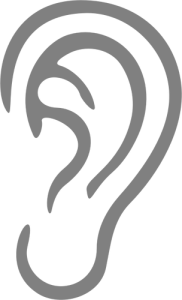 Test your listening comprehension. (Courtesy of Dr. Claudia Kost, University of Alberta.)
Test your listening comprehension. (Courtesy of Dr. Claudia Kost, University of Alberta.)
Ex. G: Dialogue. Read the following dialogue aloud. Then answer the questions about them in complete sentences.
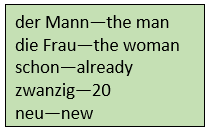
Frau: Guten Tag!
Mann: Guten Tag!
Frau: Ich bin Rita. Und Sie? Wie heißen Sie?
Mann: Ich heiße Frank.
Frau: Freut mich! Ich bin neu hier. Ich komme aus München, aber jetzt wohne ich in Stuttgart.
Mann: Echt? Ich komme auch aus München, aber ich wohne schon zwanzig Jahre hier.
- Wie heißt die Frau?
- Wie heißt der Mann?
- Woher kommt die Frau?
- Woher kommt der Mann?
- Wo wohnt die Frau jetzt?
- Wo wohnt der Mann?
EXTRA PRACTICE with greetings, names, countries, verbs “heißen/kommen/sein,“ asking how someone is, and du vs. Sie.
You will need to set up an account (free!), and click on the A1 course. Click on the tab to change the site interface to English if you wish…or try it in German. Each lesson includes written, listening, and speaking exercises with fill-in-the-blank or multiple-choice questions.

